Students celebrate Malaysian culture
November 4, 2013
With the banging of cymbals and fast strikes on Chinese drums the two red and white lions on the stage of the Great Hall come to life.
They blinked their eyes and moved their ears while stomping and jumping to the rhythm of the music. The Guang Hwa Lion Dance group performed the opening act of the Malaysian Cultural Night on Sunday, Nov. 3.
The two lions fight and dare each other to perform jumps from bench to bench. And with a final flourish of the music they rise once more, the two people in the costume standing on each others shoulders making the lions reach an incredible height.
With such performances, a tragic spellbinding play and exotic food, the cultural night drew its audience into the world of Malaysian culture.
For the first time in the event’s history, the different performances were embedded in a play called “The Legend of Mahsuri.”
Throughout the play seven performances displayed the vast diversity of Malaysia. It’s a country that is shaped by it’s three major ethnic groups: Chinese, Indian and Malay.
“This is a really good chance to show people our culture,” said Muhammad Hariri, sophomore in electrical engineering and participant in the cultural night.
The lion dance presents the Chinese influences in Malaysian culture. The play itself is a Malaysian myth, telling the story of the beautiful woman Mahsuri who lived on the island Langkawi centuries ago, Hariri said.
Mahsuri is falsely accused of adultery while her husband is at war and with her dying breath curses the island to be without prosperity and happiness for seven generations.
The Indian influence was represented by the Malaysian Indian Fusion dance, a mixture of different Bollywood dances.
But there is even more to Malaysian culture since Islam is one of the major religions practiced. At the beginning of the night, a prayer was said in Arabic along with a singing performance.
And while the play developed another tradition was inserted into it. A practice called Dikir Barat.
“It is like dancing but [while] sitting down. You give movement by moving your hands and your head instead.” Hariri said.
At the same time the performers sang in Arabic and Malay, showing so much power and action even though they were sitting down and moved only their upper bodies.
Following this the play brought the audience back to its climax. The innocent Mahsuri is accused of adultery, a crime that was in former times punishable by death.
While one of the guards lifted the dagger to deliver the fatal blow, Ezza Melinas voice, senior in psychology and actress of Mahsuri, boomed trough the Hall, “For seven generations Langkawi will have no prosperity, no happiness!”
With her dying breath, her blood flowed white, symbolizing her innocence and Langkawi’s doom for the next seven generations to come.
More than 200 guests were in attendance.
The ISU Bhangra Dance group took to the stage, closing the evening with a fast and energy-packed dance performance.
“By having the play and the performances incorporated there [were] a lot more people involved,” Melina said.

















